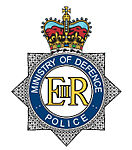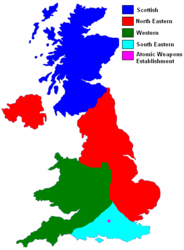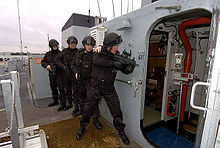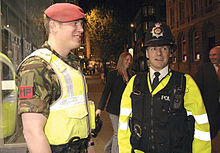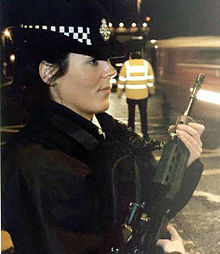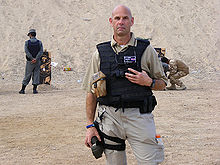- Ministry of Defence Police
-
Ministry of Defence Police Abbreviation MDP Badge of the Ministry of Defence Police. Motto Protecting the UK's Defence capability Agency overview Formed 1971 Annual budget £291 million [1] Legal personality Governmental: Government agency Jurisdictional structure National agency
(Operations jurisdiction)United Kingdom Map of MDP divisions Legal jurisdiction MDP jurisdiction Constituting instrument Ministry of Defence Police Act 1987 General nature Operational structure Headquarters Wethersfield Constables 3,496 [2] Agency executive Steven Love, Chief Constable Divisions 5 Facilities Stations 86 Website www.mod.police.uk The Ministry of Defence Police (MDP) is a civilian police force which is part of the United Kingdom's Ministry of Defence. The force is part of the larger government agency, the Ministry of Defence Police and Guarding Agency (MDPGA), together with the Ministry of Defence Guard Service. The MDPGA was formed in 2004 by bringing the two organisations together under a single administrative headquarters. The MDP are not Military Police and should not be confused with the Royal Military Police or any other Service Police organisation. The MDP has an established strength of 3,440 police officers, based at 86 locations across the United Kingdom.
The force was originally formed in 1971 by the merger of three separate service constabularies: the Air Force Department Constabulary, the Army Department Constabulary, and the Admiralty Constabulary. The force, which consists of five divisions, is headquartered at MDPGA Wethersfield, Essex.
Although superficially similar to other UK police forces, the MDP is significantly different in role, function and accountability. The MDP's primary responsibility is to provide armed security and counter terrorism, as well as uniformed policing and investigative services to Ministry of Defence property, personnel, and installations throughout the United Kingdom. MDP officers are attested as constables under the Ministry of Defence Police Act 1987. All MDP officers are trained to use firearms and 75% of those on duty are armed at any given time.
The force has a number of specialised departments and also provides officers for international policing secondments; including the active policing of conflict areas overseas and training of resident police forces in these areas. These overseas missions are carried out under the mandates of the United Nations, NATO, or the Foreign and Commonwealth Office.
The MDP is poised for significant restructuring between 2011 and 2014 as part of the coalition government's post 2010 austerity measures, and the Strategic Defence and Security Review. It is expected to lose 20% of its manpower and stations; to concentrate on high end tasks such as nuclear weapons security, mobile armed policing of the defence estate and defence financial crime.[3]
Contents
History
Main article: History of the Ministry of Defence PoliceThe Ministry of Defence Police was formed in 1971 by the merger of three civil constabularies, the Air Force Department Constabulary (previously under the control of the Air Ministry), the Army Department Constabulary (previously under the control of the War Office), and the Admiralty Constabulary (previously under the control of the Admiralty).[4]
These earlier constabularies were formed as a result of the Special Constables Act 1923, although their histories can be traced back much further as watchmen.[4] Their powers came from different legislative sources. In 1984, the House of Commons Defence Select Committee recognised the difficulties under which the Ministry of Defence Police were operating; the committee's recommendations led to the passing of the Ministry of Defence Police Act 1987.[4]
Function
The MDP's primary responsibility is policing the Defence Estate throughout the United Kingdom, including armed front-line security at high security sites; it deals with both military personnel and civilians. The MDP are not Military Police and should not be confused with the Royal Military Police or any other Service Police organisation. Although some critics in the press and pressure groups consider the MDP to be a Paramilitary force,[5][6] a claim that is denied by the MDP and the UK government.
The MDP's activities fall into five key areas:
- Armed security and counter-terrorism [7]
- Uniformed policing
- Investigation of crime
- Defence community policing
- International policing
Deployment
Main article: List of Ministry of Defence Police locationsThe MDP is currently deployed at 86 locations around the United Kingdom. These include—but are no longer limited to—military establishments, defence housing estates, military training areas, the royal dockyards, and the Atomic Weapons Establishment. Since January 2008, the MDP has also taken on the role of providing armed security at four gas terminals in the UK, part of the Critical National Infrastructure.[8]
The MDP once had a presence at 120 Ministry of Defence sites such as the Royal Arsenal, munitions and storage depots, Royal Ordnance Factories, and Defence Research Establishments. The end of both the Cold War and The Troubles in Northern Ireland, along with the subsequent closure of the Royal Arsenal, Woolwich, and the privatisation of entities such as the Royal Ordnance Factories reduced the number of sites that need an MDP presence. Many Armed Forces locations that previously relied upon the MDP for armed security have transferred that role to the Military Provost Guard Service. Some have retained an MDP presence for purely policing purposes, albeit in reduced numbers.
Jurisdiction
 MDP officers armed with MP7s patrol the Government Security Zone in Whitehall, London, during Operation Toga 2005
MDP officers armed with MP7s patrol the Government Security Zone in Whitehall, London, during Operation Toga 2005 Main article: Ministry of Defence Police jurisdiction
Main article: Ministry of Defence Police jurisdictionMDP officers are attested as constables in one of the three jurisdictions of the UK: England & Wales, Scotland, and Northern Ireland, but can exercise their powers on Ministry of Defence estate throughout the United Kingdom and additionally in the circumstances described below.[9] MDP officers' jurisdiction relates to subject rather than geographic area and is set out in section 2 of the Ministry of Defence Police Act 1987,[10] which was amended by the Anti Terrorism Crime and Security Act 2001. Officers are based throughout the UK and exercise their jurisdiction over matters relating to the Defence Estate; there is no requirement for them to be on Ministry of Defence land when doing so.[11]
The MDP is classified by the Serious Organised Crime and Police Act 2005 as a special police force. This gives it conditional allowance to exercise the powers available to a constable of a territorial police force; if an offence or incident is encountered outwith their natural jurisdiction. Additionally the MDP is able to provide officers and specialist units to territorial police forces on a mutual assistance basis.
MDP officers are also able to take on the powers of constables of territorial police forces or other special police forces (such as British Transport Police) in certain situations, as set out in the Ministry of Defence Police Act (as amended).[11] This is known as 'extended jurisdiction'. The protocol that governs this states that MDP officers should only seek to use these extended powers if they come across a situation outside their natural jurisdiction, during the course of their MDP duties. Whenever MDP officers exercise police powers under this 'extended jurisdiction', the Chief Constable MDP has a responsibility to ensure the local Chief Constable is notified as soon as possible.[12]
Policing protocols with other forces
Local agreements with territorial police forces are made under the overarching general protocols agreed between the MDP Chief Constable and other Chief Constables. These set out the agreed working relationship between the MDP and other police forces; outlining, where necessary, areas of responsibility and accountability. The Protocols make provision for consultation and co-operation between the forces, with the aim of delivering the best policing on the ground.[13]
Command structure
The MDP has its own Chief Constable who also serves as the Chief Executive of the MDPGA. The MDP uses the standard British police rank structure. Since 1995, its headquarters has been located at the former United States Air Force base at Wethersfield, now designated MDPGA Wethersfield. Force-wide command and control facilities are provided from the Central Control Room and Gold Command Suite. MDPGA Wethersfield is also home to the Agency Training Centre, which is responsible for the initial training and development of all MDP Constables and MGS guards.
The MDP has five land-based divisions: (last restructured in 2003 and currently under review)
- Scottish Division
- North Eastern Division
- Western Division
- AWE Division
- South East Division
Each division is commanded by a Chief Superintendent and has its own Divisional Command and Control Room which has direct communications with force headquarters, divisional CID, and Divisional Support Groups which are able to respond at short notice to any unforeseen incident or emergency. Each station is commanded by a Senior Police Officer who will vary in rank from Sergeant to Superintendent depending on the station's size, role and staffing.
Personnel
The established strength of the MDP at the end of 2010 was 3496 Officers, of whom 3153 are male and 343 are female.[2]
Entry requirements
Entry requirements for new officers are exactly the same as for UK territorial police forces; however, because all MDP officers can carry firearms, the eyesight focal acuity standard is higher. Entrants must also be British nationals.[14] The MDP recruits nationally and new entrants can be given a posting anywhere in the UK. In practice most new entrants end up in AWE Division or at RNAD Coulport.
Officers are selected via the NPIA SEARCH assessment centre process.[15] In addition candidates are required to pass the MDP job related fitness assessment[16] and a firearms aptitude test.
Initial training
MDP recruits are trained at the Agency Training Centre at MDPGA Wethersfield on a 17 week fully residential course. The program follows the NPIA initial learning and development syllabus.[17] An MDP anomaly is that there are separate English Law and Scottish Law classes dependent on the individual officer’s posting. Recruits are trained in personal safety including PAVA, extendable baton and kwikcuffs. They also receive Level three public order training. The final stage of the course includes the police basic driver assessment (only for driving licence holders) and a 4 week Authorised Firearms Officer course held at the Firearms Training Centre at MDPGA Wethersfield.
Security clearance
In addition to pre-entry security checks, all MDP officers are required to hold at least UK Government Security Check (SC) clearance (which clears the holder to UK Secret level). All AWE Division officers, and about 30% of all other officers, are required to hold Developed Vetting (DV) status which involves an intrusive background investigation and formal interviews.[18] DV status clears the officer to UK Top Secret level. Not all officers pass the DV process;[19] such officers are then employed at SC security level within the force.
Those officers working with US Forces in the UK are required to hold a US Common Access Card for which the US Government carries out its own security checks on the officer.[20]
Terms and Conditions
New entrants perform a two year probationary period.
Discipline in the MDP is governed by the Ministry of Defence Police (Conduct) Regulations 2009,[21] which broadly resemble the Police (Conduct) Regulations 2008 that govern territorial police forces. MDP officers retain a full national mobility liability, and can be posted anywhere in the UK at any time. In practice most movement is voluntary, either on promotion or requested moves for personal reasons. Like all UK police forces the MDP does not have the right to take strike action.
MDP pay follows the same scale as territorial police forces; however, MDP officers are part of the Civil Service Pension Scheme, not the Police Pension Scheme and only contribute 3.5% of their gross salary, compared to territorial police force officers who contribute 11%. To even out this anomaly, MDP officers pay is abated. This is known as the MDP Net Pay Deduction.[22]
The MDP operates a random and 'with cause', alcohol and drugs screening policy. An annual fitness test for all AFOs is to be introduced.[23]
Defence Police Federation
Main article: Defence Police FederationThe MDP has its own federation separate from Home Office Police Federations. The Defence Police Federation (DPF) was created in 1971 and has legal status by provision of the Ministry of Defence Police Act 1987. The DPF functions in a similar fashion to a Trade Union and aims to do for its members, what trades unions seek to do for theirs: to safeguard their interests and represent them in all matters concerning their work, and their well-being and quality of life whilst at work. Membership is voluntary.[24]
Uniform, armament and equipment
Uniform
The majority of MDP officers are often employed on firearms duties and wear black jackets and trousers, or black polo-type shirts. Head dress depends on role, and is either the standard UK police checkered flat cap or police baseball cap. Ballistic body armor, and a black Kevlar ballistic helmet can also be worn. Some specialist firearms officers (such as those in TSG and SEG) wear dark blue Nomex coveralls.
Officers on unarmed, general police duties wear a uniform similar to that of territorial police forces; including traditional Custodian helmet or flat cap (for men) or bowler (for women). The Tunic dress uniform worn by MDP officers is almost identical to that of the Metropolitan Police Service, apart from insignia. All officers are issued with personal body armour, PAVA incapacitation spray, batons and kwikcuffs, and other standard items of police duty belt kit.
Armament
All MDP officers are trained to use firearms and about 75% are armed at any one time.[25] Most officers are armed with the force weapon, the Heckler & Koch MP7.[26]
Some specialised units use weapons such as the Heckler & Koch MP5 and/or the Sig 229 Pistol. Such units include those working within the Government Security Zone,[27] the Tactical Support Group, and Special Escort Group. The Sig 229 Pistol has now replaced the Browning 9mm within units that carry a sidearm. Units based in the London area are also armed with a Taser; this is now rolling out to all armed officers as a less-than-lethal option together with the Baton Launcher, already in service.
Officers within AWE Division and those working with Nuclear Weapons or Defence SNM carry the 2007 variant of the L85A2 assault rifle fitted with the Trijcon ACOG sight.[2]
Vehicles
The MDP uses a variety of vehicles, from general patrol cars to specialised escort vehicles, police launches, and off-road vehicles. In 2006 the force adopted the 'Battenburg' system of retro-reflective markings for its new vehicles. This brings the MDP's fleet appearance in line with most other UK police forces.
AWE Division and SEG use the Armoured MacNeillie Mercedes Protected Patrol Vehicle.[28] Where used on public roads, these are coloured dark blue, with Battenburg markings. When used within Ministry of Defence establishments only, they are coloured olive drab with black 'Police' markings. This vehicle replaced the MDP's previous armoured vehicle, the Alvis Tactica in 2010.
Special capabilities
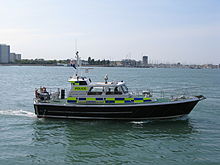 MDP launch in Portsmouth
MDP launch in Portsmouth
Marine unit
The MDP has the largest marine support unit of any of the police forces in the UK. The marine support units are responsible for the waterborne security of Her Majesty's Dockyards and HM Naval Bases. At HMNB Clyde, it works with the Fleet Protection Group Royal Marines.
Chemical, biological, radiological or nuclear response
 MDP officer on range—with MP7 in CBRN Suit. (Note: This officer is wearing a Training DPM Mk4 Military CBRN suit. Operationally MDP wear Blue Mk4 CBRN suits)
MDP officer on range—with MP7 in CBRN Suit. (Note: This officer is wearing a Training DPM Mk4 Military CBRN suit. Operationally MDP wear Blue Mk4 CBRN suits)
Although only constituting 1.5% of the national police force, the MDP has 8% of the national chemical, biological, radiological or nuclear (CBRN) response capability. Unlike territorial police forces, all MDP officers are trained in CBRN defence. Officers deployed to AWE Division are trained to work in radiologically controlled environments. The force maintains a large pool of specially-trained officers nationally, known as the Nuclear Guard Force (NGF) who can be deployed at short notice in the event of a nuclear accident; they perform this function alongside the UK's national Nuclear Accident Response Organisation (NARO).[29][30]
Dog sections
The 400 police dog handlers in the force utilise explosive, drug, tactical firearms support, and general purpose police dogs.
Special Escort Group
Main article: Special Escort Group (Ministry of Defence Police)The MDP Special Escort Group protects nuclear weapons and defence special nuclear material in transit.
Criminal Investigation Department
The MDP has a Criminal Investigation Department with offices spread around the UK. The CID investigates defence-related crime. There are a number of specialised units that fall under the larger CID remit. Officers employed within these specialised units must first qualify as a detective. Such units include:
- Fraud Squad: The Fraud Squad investigates fraud in Ministry of Defense programmes.
- Force Intelligence Bureau: The FIB consists of a number of specialists such as Crime Intelligence Officers, CHIS handlers, Communications Data Investigators (SPoCs), and Special Branch officers who support other investigators, carry out investigations, and gather operational intelligence in cases which merit their attention.
- Crime Scene Investigation: The Force has a number of Forensic Science officers (CSI), formally known as SOCO, who are available to each division.
- Surveillance Unit: The Surveillance Unit provides a specialised covert surveillance capability in support of MDP investigations.
- Major Incident Unit: The Major Incident Unit (MIU) is a group of specially-trained investigators who provide oversight and management of incidents that have caused serious disruption, or in support of complex investigations. Officers in the MIU are trained in the use of the HOLMES software suite and have a variety of specialist equipment at their disposal.
- Computer Crime Unit: The Computer Crime Unit provide specialist IT skills and personnel to gather evidence from IT systems, for use in MDP investigations.
Divisional Support Groups
Divisional Support Groups (DSG) provide operational policing support at a local level. There is at least one DSG unit per division.
Operational Support Units
Main article: Operational Support Unit (Ministry of Defence Police)Operational Support Units (OSU). The OSU is the MDP's mobile, flexible reserve. Each OSU is a 50-strong rapid response unit tasked with VIP personal protection, public order, and anti-terrorist search duties. The force has two OSU units to cover the north and south of the country. OSU South are based at MDPGA Wethersfield, and OSU North are based at RAF Linton-on-Ouse.
Tactical Support Group
The Tactical Support Group are a specialist group of officers found only within AWE Division. MDP TSG are tasked with and equipped to provide an advanced firearms response capability at short notice to the Atomic Weapons Establishment. The TSG specialize in dynamic entry and dynamic intervention inside Nuclear Weapons facilities; including, if necessary, the recapture of Nuclear Weapons and Special Nuclear Material.[31]
Defence community police officers
These are unarmed MDP officers who provide community policing to Defence establishments or large military housing estates, in a similar manner to the Neighbourhood Policing Teams of territorial police forces. DCPOs work in small teams or often alone, either from dedicated MDP stations, Service Police stations, or embedded with the local police force.
International policing
The MDP carries out a number of international policing activities, including the active policing of conflict areas overseas and training of resident police forces in these areas. These overseas missions are carried out under the mandates of the United Nations, NATO, or the Foreign and Commonwealth Office. MDP officers employed overseas routinely carry at least a Sig 229 Pistol for protection.
Approximately 100 MDP officers are deployed overseas, with the largest numbers in Kosovo and Afghanistan.[32][33]
In recent years the MDP have provided officers to Police contingents in many locations around the world, including Bosnia, Kosovo, Iraq, Afghanistan, Sudan, and Sierra Leone.
The MDP also provided policing for the Pitcairn Islands from around 2000 until 2007.
Notable incidents and investigations
- 1997: Milos Stankovic: British Army officer Major Milos Stankovic MBE, whose father was a Serbian, was arrested and interviewed by MDP in 1997 under the Official Secrets Act acting on information that alleged that he, while serving as a Serbo-Croat interpreter for senior British Army officers in Sarajevo passed sensitive information to the Bosnian Serbs.[34] During the investigations, MDP officers interviewed more than 100 witnesses in Britain and abroad. But the investigation, which cost more than £250,000 in total, found no evidence of espionage. The case did not proceed to trial. Stankovic went to the press, and sued the MDP for £1Million compensation. In 2007 Mr Justice Saunders threw out the majority of his case and awarded just £5000 for MDP "seizing and removing items outside the terms of a search warrant" but making Stankovic liable for all costs (circa £500,000) " [35]
- 1998, Tony Geraghty: British–Irish author and journalist Tony Geraghty was arrested and his house searched by MDP Special Branch, investigating offences against the Official Secrets Act involving his contact with a former Northern Ireland bomb disposal officer Lt-Col Nigel Wylde. Wylde was subsequently charged with passing secrets to Geraghty, but the case collapsed during trial. It caused much concern in the media that the MDP was effectively beyond public accountability and had the power to impede the freedom of the press.[36][37]
- 2003–2004, Pitcairn Island Child Abuse investigations (Operation Unique): MDP officers were deployed to Pitcairn as part of the international investigation team into communal child sexual abuse on the island.[38]
- July 7th 2005, Response to London suicide bombings (Operation Toga): This operation saw the MDP's largest deployment of firearms officers on a non Ministry of Defence tasking, to assist the Metropolitan Police to counter the threat of further suicide attacks in Central London.[39]
- 2001–2005, Deepcut Barracks suspicious deaths of 4 soldiers: MDP CID Involvement in investigations, which later led to a complaint to the The Independent Police Complaints Commission (IPCC) by deceased's families, who refused to believe police conclusions that each of the deaths by shooting, of the 4 soldiers, was suicide. Families alleged that MDP involvement was MoD "collusion" with Surrey Police which "enabled the MoD to cover up events" [40] An independent review by Mr Nicholas Blake QC in 2007 absolved Surrey Police and MDP of any wrongdoing, but was highly critical of the Army. The events of the deaths are the subject of the stage play "Deep Cut" by Philip Ralph.[41]
- 2006, Ipswich Prostitute Murders: MDP Provided an OSU and 100 additional officers for searches and enquiries at the request of Suffolk Constabulary following the murder of 5 prostitutes by Steve Wright[42]
- 2008, Helmand Province (Afghanistan): A counter heroin operation by Afghan National Police and MDP seizes 17.5 Tonnes of Opium poppy seeds (enough for 30 tonnes of pure heroin)[43]
- 26 January 2009, Death of Krzysztof Lubkiewicz: The IPCC investigated the MDP after the death of a Polish national immediately after contact with MDP Officers. The Officers themselves were later exonerated, however the IPCC criticised the MDP's divisional control room's procedures, and their communication with other forces. This was the first investigation of the MDP by the IPCC after its jurisdiction was extended to include the MDP in 2008.[44][45]
- 29 September 2010: The leak of Secretary of State for Defence Liam Fox's letter to Prime Minister David Cameron: MDP CID London and OSU South were tasked to search MoD Headquarters in Whitehall, and carry out an investigation to uncover the person(s) responsible for leaking a highly damaging letter from Defence Secretary Liam Fox to Prime Minister David Cameron, to the press. In the letter Fox expressed grave concerns about forthcoming defence cuts.[46] No one was ever charged.[47][48]
Affiliated police forces
The Ministry of Defence also has responsibility for two other civilian police forces:
- The Sovereign Base Areas Police (SBAP), Cyprus: The SBAP provide a full range of policing for both the Eastern and Western Sovereign Base Areas of Cyprus.
- The Gibraltar Defence Police (GDP): The GDP provide police services on Ministry of Defence land and waters in Gibraltar.
Officers from both these forces occasionally attend courses at the Ministry of Defence Police Agency Training College at Wethersfield, Essex. In June 2005 officers from the GDP marine unit gave assistance to the MoD Police marine unit at Portsmouth during the Trafalgar 200 celebrations.
See also
- Ministry of Defence Police and Guarding Agency
- United States Department of Defense Police
- List of police forces in the United Kingdom
- Policing in the United Kingdom
References
- ^ MDPGA - Chief Executive's Annual Report and Accounts 2006-07. Her Majesty's Stationery Office. 2007. pp. 76. http://www.official-documents.gov.uk/document/hc0607/hc06/0624/0624.pdf
- ^ a b c http://www.mod.police.uk/Publications%20PDF/MDPGAannrept0910[1].pdf
- ^ Harding, Thomas (15 January 2011). "Security threat warning over MoD police cuts". The Daily Telegraph (London). http://www.telegraph.co.uk/news/newstopics/politics/defence/8259614/Security-threat-warning-over-MoD-police-cuts.html.
- ^ Norton-Taylor, Richard (2 April 2001). "Bill could turn MoD police into a paramilitary force, Tories warn". The Guardian (London). http://www.guardian.co.uk/uk/2001/apr/02/conservatives.humanrights.
- ^ http://www.srcf.ucam.org/camsaw/legal/atcs2001.pdf
- ^ http://www.mod.uk/DefenceInternet/AboutDefence/WhatWeDo/SecurityandIntelligence/MDPGA/ModPoliceArmedSecurityAndCounterterrorism.htm
- ^ http://www.mod.uk/DefenceInternet/DefenceNews/DefencePolicyAndBusiness/ModPoliceToContinueProtectingUkGasInstallations.htm
- ^ http://www.statutelaw.gov.uk/content.aspx?LegType=All+Legislation&title=ministry+police+act&searchEnacted=0&extentMatchOnly=0&confersPower=0&blanketAmendment=0&sortAlpha=0&TYPE=QS&PageNumber=1&NavFrom=0&parentActiveTextDocId=602920&ActiveTextDocId=602923&filesize=6240
- ^ http://www.statutelaw.gov.uk/content.aspx?LegType=All+Primary&PageNumber=33&NavForm=2&parentActiveTextDocId=602920&ActiveTextDocId=602920&filesize=86516
- ^ a b http://www.statutelaw.gov.uk/content.aspx?LegType=All+Legislation&title=ministry+police+act&searchEnacted=0&extentMatchOnly=0&confersPower=0&blanketAmendment=0&sortAlpha=0&TYPE=QS&PageNumber=1&NavFrom=0&parentActiveTextDocId=602920&ActiveTextDocId=602924&filesize=30879
- ^ http://www.homeoffice.gov.uk/about-us/home-office-circulars/circulars-2008/028-2008/
- ^ www.mod.uk/
- ^ http://www.mod.uk/DefenceInternet/AboutDefence/WhatWeDo/SecurityandIntelligence/MDPGA/ModPoliceRecruitment.htm
- ^ http://www.npia.police.uk/en/13932.htm
- ^ http://www.mod.police.uk/Publications%20PDF/FITNESS%20TEST%20-%20CANDIDATE%20GUIDE.pdf
- ^ http://www.npia.police.uk/en/12881.htm
- ^ http://www.mod.uk/DefenceInternet/AboutDefence/WhatWeDo/SecurityandIntelligence/DVA/TheVettingProcess.htm
- ^ http://www.mod.uk/NR/rdonlyres/C2C0389A-F1C8-4771-97A5-1DDFBCBE58BE/0/DVASubjectInformationLeaflet.pdf
- ^ http://www.mod.police.uk/Recruitment.html
- ^ http://www.mod.police.uk/Publications%20PDF/TheMinistryofDefencePoliceConductRegulations2009.pdf
- ^ http://www.mod.police.uk/Pay%20&%20Benefits.html
- ^ http://www.mod.police.uk/Publications%20PDF/mdpgacorpbusplan201014.pdf
- ^ http://www.dpf.org.uk/index.php
- ^ http://www.mod.police.uk/Firearms%20Training.html
- ^ "MoD Police takes delivery of 21st Century Weapon". Government News Network. http://www.gnn.gov.uk/Content/Detail.asp?ReleaseID=149705&NewsAreaID=2. Retrieved 2007-05-05.
- ^ Talkthrough 122
- ^ MacNeillie: All-new 7.5 tonne gvw Protected Escort Vehicle (PEV)
- ^ MoD JSP 471 (Unclas)
- ^ http://www.mod.uk/DefenceInternet/AboutDefence/WhatWeDo/HealthandSafety/NSEP/NuclearAccidentResponseOrganisationnaro.htm
- ^ http://www.mod.police.uk/Specialisations.html
- ^ http://www.policeoracle.com/news/MoD-Police-Officers-Fight-Crime-In-Helmand_21480.html
- ^ "Conference 2004 - Speech by Ivor Caplin MP, Under Secretary of State, MoD". Defence Police Federation. Archived from the original on 27 September 2007. http://web.archive.org/web/20070927224453/http://www.dpf.org.uk/conf/minister04.shtml. Retrieved 2007-05-05.
- ^ http://www.newstatesman.com/199910250022
- ^ "Ex-major loses case against MoD". BBC News. 9 November 2007. http://news.bbc.co.uk/1/hi/uk/7087155.stm.
- ^ "Strange police". The Guardian (London). http://www.guardian.co.uk/comment/story/0,3604,420223,00.html.
- ^ Jury, Louise; Brown, Colin (21 January 2001). "New MoD police powers 'threaten press'". The Independent (London). http://www.independent.co.uk/news/media/new-mod-police-powers-threaten-press-703014.html.
- ^ http://www.independent.ie/unsorted/features/the-sex-abuse-trial-casting-a-long-cloud-over-a-tiny-island-156302.html
- ^ Talkthrough magazine 124 Page 4
- ^ http://www.thisislondon.co.uk/news/article-5363697-mod-in-deepcut-cover-up.do
- ^ http://www.official-documents.gov.uk/document/hc0506/hc07/0795/0795.pdf
- ^ "Suffolk killings: Inquiry so far". BBC News. 19 December 2006. http://news.bbc.co.uk/1/hi/uk/6193243.stm.
- ^ Harvey, Oliver (16 November 2008). "900M Heroin Bust Biggest Haul Ever". The Sun (London). http://www.thesun.co.uk/sol/homepage/news/campaigns/our_boys/article1936691.ece.
- ^ http://www.ipcc.gov.uk/news/Pages/pr160209_mod.aspx
- ^ http://www.mirror.co.uk/news/top-stories/2009/11/07/man-killed-after-cops-refuse-help-115875-21803893/
- ^ "Defence cuts: Liam Fox's leaked letter in full". The Daily Telegraph (London). 28 September 2010. http://www.telegraph.co.uk/news/newstopics/politics/defence/8031385/Defence-cuts-Liam-Foxs-leaked-letter-in-full.html.
- ^ "Police search MoD headquarters for letter leak source". BBC News. 29 September 2010. http://www.bbc.co.uk/news/uk-politics-11432620.
- ^ Shipman, Tim (30 September 2010). "Hunt for MoD mole: Fox calls in police to find out who leaked letter on 'draconian' defence cuts". Daily Mail (London). http://www.dailymail.co.uk/news/article-1316106/Liam-Fox-calls-police-MoD-mole-leaked-defence-cuts-letter.html.
External links
- MDP Force Website
- TalkThrough The MDP Force Magazine
- MDP on MoD website
- MDP Operation in Afghanistan
 Police forces of the United Kingdom
Police forces of the United KingdomEngland - Avon and Somerset
- Bedfordshire
- Cambridgeshire
- Cheshire
- City of London
- Cleveland
- Cumbria
- Derbyshire
- Devon and Cornwall
- Dorset
- Durham
- Essex
- Gloucestershire
- Greater Manchester
- Hampshire
- Hertfordshire
- Humberside
- Kent
- Lancashire
- Leicestershire
- Lincolnshire
- Merseyside
- Metropolitan
- Norfolk
- North Yorkshire
- Northamptonshire
- Northumbria
- Nottinghamshire
- South Yorkshire
- Staffordshire
- Suffolk
- Surrey
- Sussex
- Thames Valley
- Warwickshire
- West Mercia
- West Midlands
- West Yorkshire
- Wiltshire
Wales Scotland Northern Ireland Special police forces - British Transport
- Civil Nuclear
- Ministry of Defence
Regional units - Central Counties Air Operations Unit
- Central Motorway Police Group
- Chiltern Air Support Unit
- East Midlands Air Support Unit
- North East Air Support Unit
- North Midlands Helicopter Support Unit
- North West Motorway Police Group
- South and East Wales Air Support Unit
- South East Air Support Unit
- Western Counties Air Operations Unit
National units  Category
Category Commons
Commons
Police services in Ireland Republic of Ireland Airport Police · Dublin Harbour Police · Dun Laoghaire Harbour Police · Garda Síochána na hÉireann · Garda Síochána Reserve · Póilíní AirmNorthern Ireland Belfast Harbour Police · Belfast International Airport Constabulary · Larne Harbour Police · Ministry of Defence Police · Police Service of Northern Ireland · Royal Military PoliceDefunct Categories:- Ministry of Defence (United Kingdom)
- Government agencies established in 1971
- Organisations based in Essex
- National police forces of the United Kingdom
- 1971 establishments in the United Kingdom
- Ministry of Defence Police
Wikimedia Foundation. 2010.

